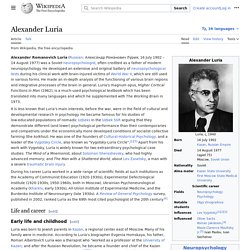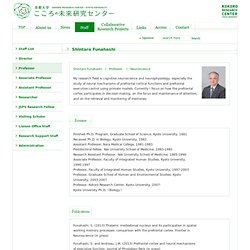

Cat communicates with its deaf owner using sign language : nextfuckinglevel. Construction on 500 Fifth Avenue, New York City, 1930. Imgur. This Week In Misinterpreted Scientific Research: Inherited Memories and Brainy Sexism. Johns Hopkins Neurology and Neurosurgery. Patient Stories Learn more about the Johns Hopkins Departments of Neurology and Neurosurgery through the eyes of our patients. back to top More Videos Dr Alfredo Quinones-Hinojosa: Dr.

Brain Pickings. 09 MAY, 2013By: Maria Popova “When the profit motive gets unmoored from the purpose motive, bad things happen.”

The question of how to avoid meaningless labor and instead find fulfilling work brimming with a sense of purpose is an enduring but, for many, elusive cultural ideal. Daniel Pink tackles the conundrum in this wonderful animation by the RSA — who have previously sketch-noted such fascinating pieces of cultural psychology as the truth about dishonesty, the power of introverts, where good ideas come from, what’s wrong with the left-brain/right-brain dichotomy, the broken industrial model of education, and how choice limits social change — based on his book Drive: The Surprising Truth About What Motivates Us (public library).
Pink shares the counterintuitive results of two studies that reveal the inner workings of what influences our behavior — and the half-truth of why money can’t buy us satisfaction: Also of note is Pink’s TED talk on the subject: Donating = Loving. Speakers who disagree with each other. TED2013 kicks off in just 11 days.

And, in the very first session, Robert J. Gordon and Erik Brynjolfsson will ascend the stage for a debate on the future of work. While Gordon will focus on how our current ecosystem of innovation is too focused on personal gadgetry, and thus isn’t setting us up to solve the big problems of the future, Brynjolfsson will express the view that the digital revolution is propelling us forward rapidly, giving us a good foundation for future prosperity. It’s shaping up to be a fascinating discussion — one that may well change your mind. This will hardly be the first time that two TED speakers have verbally jousted oon the TED stage.
Paul Zak vs. In these two talks given a year apart, neuroscience experts Paul Zak and Molly Crockett disagree on what we can say about oxytocin. Peter Diamandis vs. Because these two speakers expressed such different views at TED2012, TED Curator Chris Anderson invited the pair onstage for a formal debate. Rick Warren vs. National Geographic Channel. Joshua Foer: Feats of memory anyone can do. Girl Living With Half Her Brain. Vilayanur Ramachandran: The neurons that shaped civilization. Greenberg Educational Consulting Organization. Education should be a process and time of unfettered learning and exploration, but all too often it is bogged down with too many rules, short-sighted narrow focus, and a lack of inspired leadership. Education defines our society and if we want a humane and egalitarian society, we need leaders and members who all strive for the depth of knowledge, skill, compassion and wisdom that is achievable through simple daily practice and regular critical review.
Because daily efforts require time, energy, and motivation and there is a lot of noise in society I am building this site to help you find and use ideas worth using. To help us all upgrade our mentality, wisdom, skill (add your goals here), what I’m working to build here is a site that works like a college education should – providing Exposure to people you haven’t met yet, ideas you haven’t heard yet and ways of thinking, arguing, and behaving that you haven’t done yet. Why mention all this? VS Ramachandran: 3 clues to understanding your brain. Rebecca Saxe: How we read each other's minds. Alexander Luria. Alexander Romanovich Luria (Russian: Алекса́ндр Рома́нович Лу́рия; 16 July 1902 – 14 August 1977) was a famous Soviet neuropsychologist and developmental psychologist.

He was one of the founders of Cultural-Historical Psychology, and a leader of the Vygotsky Circle. Luria's magnum opus was his textbook on neuropsychology titled Higher Cortical Functions in Man (1962) which has been translated into multiple laguages, and which was supplemented with his book titled The Working Brain in the 1970s. Apart from his work with Vygotsky, Luria is widely known for his later work with two extraordinary psychological case studies, his study of a man with a highly advanced memory, published as "The Mind of a Mnemonist", and the study of a man with traumatic brain injury, published as "The Man with a Shattered World". Biography[edit] Luria was born in Kazan, a regional center east of Moscow, to Jewish parents. Early life and childhood[edit] Early education and move to Moscow[edit] The war years[edit] Kokoro Recearch Center, Kyoto University. Funahashi, S. (2013) Thalamic mediodorsal nucleus and its participation in spatial working memory processes: comparison with the prefrontal cortex.

Frontier in Neuroscience (in press) Funahashi, S. and Andreau, J.M. (2013) Prefrontal cortex and neural mechanisms of executive function. Journal of Physiology Paris (in press) Humanity's 7 Primal Emotions. The Genetics Myth - Clip from Zeitgeist 3: Moving Forward. Video channel on TED.com. 'Construct' Scenes. How Neurons Work. BrainU Cartoon: The Action Potential. Inner Life Of A Cell - Full Version.